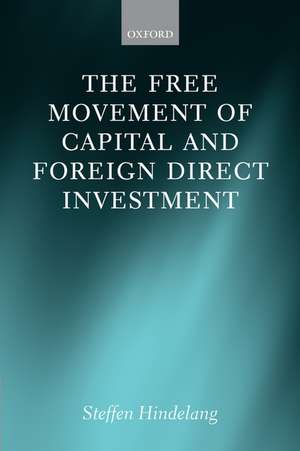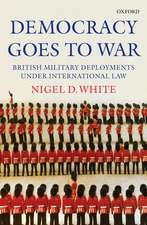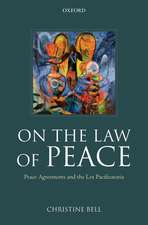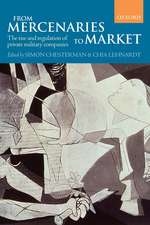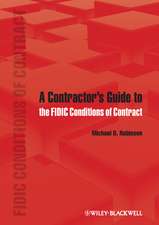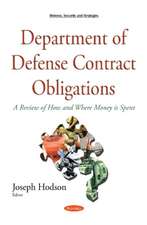The Free Movement of Capital and Foreign Direct Investment: The Scope of Protection in EU Law
Autor Steffen Hindelangen Limba Engleză Hardback – 8 iul 2009
Preț: 837.81 lei
Preț vechi: 1266.90 lei
-34% Nou
Puncte Express: 1257
Preț estimativ în valută:
160.31€ • 167.83$ • 132.65£
160.31€ • 167.83$ • 132.65£
Carte tipărită la comandă
Livrare economică 25-31 martie
Preluare comenzi: 021 569.72.76
Specificații
ISBN-13: 9780199572656
ISBN-10: 0199572658
Pagini: 448
Dimensiuni: 164 x 240 x 29 mm
Greutate: 0.83 kg
Ediția:New.
Editura: OUP OXFORD
Colecția OUP Oxford
Locul publicării:Oxford, United Kingdom
ISBN-10: 0199572658
Pagini: 448
Dimensiuni: 164 x 240 x 29 mm
Greutate: 0.83 kg
Ediția:New.
Editura: OUP OXFORD
Colecția OUP Oxford
Locul publicării:Oxford, United Kingdom
Recenzii
Hindelang's book is a very thorough study, with ample references to primary and secondary material, especially the abundant literature in German which he makes accessible to English readers for the first time. It will be the first port of call for free movement of capital in general and cross-border investment protection in particular under European Union law. Its scholarly influence will also radiate beyond the free movement of capital to the other freedoms, especially the freedom of establishment.
...A remarkable piece. It bears witness to the growing interconnectedness of different areas of international law that have hitherto led lives in (splendid) isolation. In the present case, it is the growing interest in the intersection between international investment law, on the one hand, and EU law, on the other. The author's study is detailed and broadly covers both the relevant scholarly writings and the pertinent case-law. It would be hard to imagine a more thorough approach than Hindelang's. This book is not only a very valuable empirical study collecting and analyzing an enormous number of mostly ECJ cases, but also an impressive scholarly work containing very clear statements of the author's own assessment of the law.
Hindelang has presented a vividly written piece of academic craftsmanship. He argues strongly for a liberal understanding of the internal market as an internationally open market. His focus is on investors and not on a presumption in favour of State sovereignty...Hindelang builds a strong opposition against the current interpretation of the Treaty rules by the ECJ and probably the mainstream in German academic literature. His study is worth reading: a thorn in the flesh of the current doctrine.
...this monograph will be an obligatory reference for all those who want to know how the free movement of capital is regulated in the EU...its up-to-date analysis of the ECJ's case law, its doctrinal effort towards the systematization of economic freedom rules, and its constant references to the German debate issues not fully dealt with in the English literature, make Hindelang's book a major contribution to the field
Hindelang makes extensive use of the voluminous German language scholarship on free movement of capital. This is one of the great attractions of his work, as well as offering rigorous analysis of case law and of the underlying principles, he opens a window and lets in the refined output of that extensive legal literature
...an important and timely contribution to an area where in-depth research in English literature has hitherto been relatively scarce...It is...written in a captivating style and many interesting arguments will certainly spark further debate. This study is also a mandatory reference in the post-Lisbon era, not least because it contains elements of a view of how the internal market mechanism circumscribes the Union's treaty-making practice in the field of FDI.
An important and timely contribution to an area where in-depth research in the English literature has hitherto been relatively scarce...It is written in a captivating style and many interesting arguments will certainly spark further debate. This study is also a mandatory reference in the post-Lisbon era
...A remarkable piece. It bears witness to the growing interconnectedness of different areas of international law that have hitherto led lives in (splendid) isolation. In the present case, it is the growing interest in the intersection between international investment law, on the one hand, and EU law, on the other. The author's study is detailed and broadly covers both the relevant scholarly writings and the pertinent case-law. It would be hard to imagine a more thorough approach than Hindelang's. This book is not only a very valuable empirical study collecting and analyzing an enormous number of mostly ECJ cases, but also an impressive scholarly work containing very clear statements of the author's own assessment of the law.
Hindelang has presented a vividly written piece of academic craftsmanship. He argues strongly for a liberal understanding of the internal market as an internationally open market. His focus is on investors and not on a presumption in favour of State sovereignty...Hindelang builds a strong opposition against the current interpretation of the Treaty rules by the ECJ and probably the mainstream in German academic literature. His study is worth reading: a thorn in the flesh of the current doctrine.
...this monograph will be an obligatory reference for all those who want to know how the free movement of capital is regulated in the EU...its up-to-date analysis of the ECJ's case law, its doctrinal effort towards the systematization of economic freedom rules, and its constant references to the German debate issues not fully dealt with in the English literature, make Hindelang's book a major contribution to the field
Hindelang makes extensive use of the voluminous German language scholarship on free movement of capital. This is one of the great attractions of his work, as well as offering rigorous analysis of case law and of the underlying principles, he opens a window and lets in the refined output of that extensive legal literature
...an important and timely contribution to an area where in-depth research in English literature has hitherto been relatively scarce...It is...written in a captivating style and many interesting arguments will certainly spark further debate. This study is also a mandatory reference in the post-Lisbon era, not least because it contains elements of a view of how the internal market mechanism circumscribes the Union's treaty-making practice in the field of FDI.
An important and timely contribution to an area where in-depth research in the English literature has hitherto been relatively scarce...It is written in a captivating style and many interesting arguments will certainly spark further debate. This study is also a mandatory reference in the post-Lisbon era
Notă biografică
Steffen Hindelang studied law and economics at the Universities of Bayreuth, Sheffield and Marburg. He was admitted to the degree of Master of Laws in International, European and Commercial Law of the University of Sheffield in 2001 and to the degree of Doctor iuris (Ph.D. equivalent) of the Eberhard Karls University Tübingen, School of Law in 2008. From 2004 until 2009 he was research associate and lecturer at the aforementioned institution. He is also a fully qualified German lawyer.
